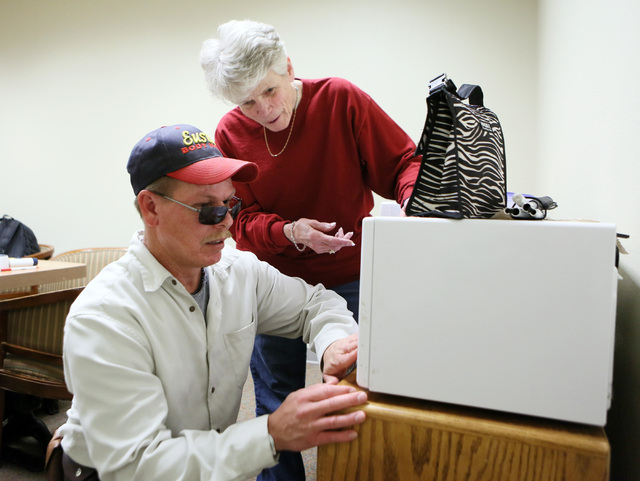Transition2 program helps blind students navigate everyday life
Sitting with his dog by his side, Chuck Hall, 38, talks about his passion for leather crafting, turkey hunting and cooking in Dutch ovens. It may come as a surprise because Hall has been blind for almost a decade.
A car accident in 2004 left the North Las Vegas resident in a coma for almost nine months. After realizing he was blind, the shock was too much for Hall, and he considered suicide.
“I was just thinking, ‘This is it. My life is over,’ ” Hall said. “My daughter got up and grabbed me by the knees and said, ‘Dad, it sucks you’re blind, but don’t worry. I’ll take you anywhere you need to go.’
“It made me change my mind. There I was, giving up, and here was a 3-year-old trying to help me.”
Although the incident caused him to lose his sense of sight and smell, Hall said life doesn’t stop for anybody.
“There isn’t anything I can’t do,” Hall said. “I just have to do it differently.”
Hall and four other students attended Transition2, a program that mentors visually impaired or blind participants through Blindconnect at the College of Southern Nevada’s Charleston Campus, 6375 W. Charleston Blvd. The classes are free because they are trial courses. Students for the trial courses had to be between the ages of 30 and 50. Once the trials are over, the course will be open to participants of all ages.
The first portion of the program teaches daily life skills and offers group support in a classroom setting. The second portion pairs participants with mentors and allows them to work from home. Altogether, the program offers more than 100 hours of hands-on training.
“They’re learning skills like matching clothes, cooking and cleaning,” said Jean Peyton of Blindconnect. “They become familiar with mobility and how to get around their community independently and how to work with technology.”
Peyton helped create Blindconnect in 1998 after realizing there weren’t adequate services offered for the blind in Nevada. The organization serves as an information, referral and peer support group.
“We identify the gaps in blind services and look to fill the gaps,” Peyton said. “No one was offering or interested in offering (Transition2), so we put it together ourselves.”
The organization plans to offer Transition2 again in the fall and early in 2015.
“We want the participants to be able to be successfully blind,” said Peyton, “meaning they’re working members of the community, they’re parents, they’re independent, things of that nature. They’re like everyone else, but they’re blind.”
Summerlin resident Ryan O’Neill, 40, helps mentor individuals in the program. He became blind at 7 after being shot in his California home during a random drive-by shooting.
“Our limitations are usually caused by people who can see,” O’Neill said. “They say, ‘Oh, the blind can’t do it because I wouldn’t be able to if I lost my vision.’ That’s the biggest problem: the limitations people automatically assume.”
However, O’Neill said he was raised to be independent. He learned to cook on the stove, go grocery shopping and get around the community on his own. In 2009, he married a woman who is also blind, and they had their first child almost two years ago.
Peyton asked O’Neill to mentor individuals and share his independence with others.
“Blindness is not an excuse; you just have to have the want to try,” O’Neill said. “People sometimes need that extra push. It’s not the end of the world just because you lost your vision.
“If you want to get back to work, you can. If you want to live life and start a family, you can. You can do pretty much anything anyone else can, within reason. If I can do it, you can do it.”
For more information, call Blindconnect at 702-631-9009.
Contact Southwest/Spring Valley View reporter Caitlyn Belcher at cbelcher@viewnews.com or 702-383-0403.
Transition2
Transition2 is a program that mentors visually impaired or blind participants through Blindconnect. Classes are offered at CSN’s Charleston Campus, 6375 W. Charleston Blvd.
For more information, call Blindconnect at 702-631-9009.




















